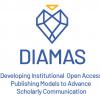Deliverable D4.6 – Equity, Diversity, Inclusion and Belonging (EDIB) in scholarly communication - working with communities to develop resources for multilingualism, gender equity and accessible and inclusive websites
This report describes the project results, additional literature review, and collaborativeprocess to develop the DIAMAS toolkits and guidelines related to Equity, Diversity,Inclusion and Belonging (EDIB). The focus of this report is on the topics of…
Listed in Report
Version 1.0 - published on 07 Dec 2024 doi: 10.5281/zenodo.13786107 - cite this
Licensed under Creative Commons BY 4.0
Description
This report describes the project results, additional literature review, and collaborativeprocess to develop the DIAMAS toolkits and guidelines related to Equity, Diversity,Inclusion and Belonging (EDIB). The focus of this report is on the topics of multilingualism,gender equity, and accessible and inclusive websites as key dimensions of EDIB, which isthe seventh core component of the Diamond OA Standard (DOAS) (Consortium of theDIAMAS project, 2024). The report builds on the work summarized in the D3.1 IPSP BestPractices Quality evaluation criteria, best practices, and assessment systems forInstitutional Publishing Service Providers (IPSPs) (Ševkušić & Kuchma, 2023). The main activity for T4.6 is to develop toolkits and guidelines to help IPSPs to manage andincrease the availability of multilingual content, to address language and gender biases intheir operations, and to develop more accessible and inclusive websites, content andmetadata. Rather than generating original information, the goal was to survey, analyze,curate and repackage existing work in this area. This report explains the collaborativeprocess used to identify such materials and to develop the DIAMAS toolkits and guidelinesrelated to EDIB. The report opens by contextualizing existing disparities in scholarly publishing. Withregard to language, it has been established that using one key language for scholarlypublishing presents disadvantages for individuals, research, and society more broadly.Individuals may need to invest more time and money and face higher rejection rates.Privileging one language also privileges one social, cultural and economic perspective andknowledge system, and it hampers uptake of findings by local actors. In terms of genderdisparities, men are cited more often, are better represented in key positions, and areoverrepresented in research studies. As regards accessible and inclusive websites,content and metadata, inequities arise when designers do not consider aspects such asalt-text, captions, adjustable font/size/colour, or plain or inclusive language. Finally, whileit is convenient to study dimensions independently, they may intersect, meaning that aperson who is marginalized along one dimension may also be marginalized along others,with cumulative effects. EDIB issues are sensitive and complex, and it can be intimidating for IPSPs to figure outhow to proceed. To develop the toolsuites and guidelines, two main approaches were used.First, the existing DIAMAS...
Cite this work
Researchers should cite this work as follows:
- Bowker, L., Pölönen, J., Laakso, M., Redhead, C., (2024), "Deliverable D4.6 – Equity, Diversity, Inclusion and Belonging (EDIB) in scholarly communication - working with communities to develop resources for multilingualism, gender equity and accessible and inclusive websites", HSSCommons: (DOI: 10.5281/zenodo.13786107)
Tags
Notes
Original publication source: Zenodo
Citation: Bowker, L., Pölönen, J., Laakso, M., & Redhead, C. (2024). Deliverable D4.6 – Equity, Diversity, Inclusion and Belonging (EDIB) in scholarly communication - working with communities to develop resources for multilingualism, gender equity and accessible and inclusive websites (1.0). Zenodo. https://doi.org/10.5281/zenodo.13786107
Publication preview
When watching a publication, you will be notified when a new version is released.
